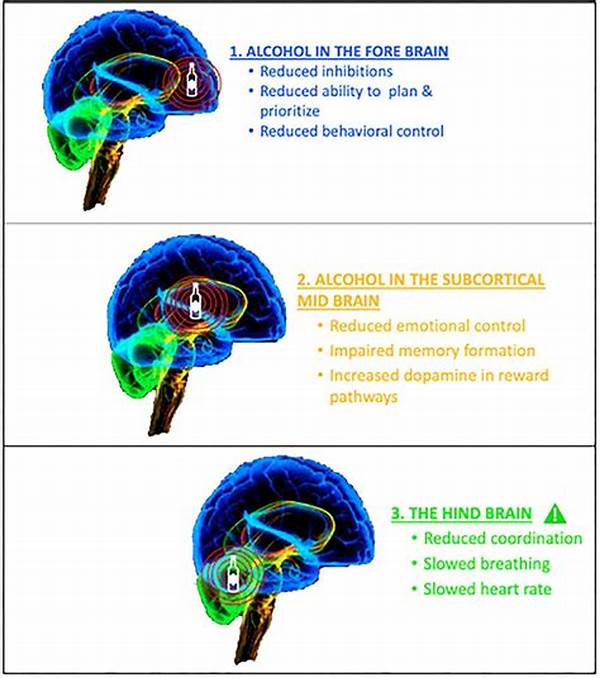
Neurological Effects Of Sustained Alcohol Use
- Daniel Anderson
- 0
- Posted on
Alcohol, it’s a part of social gatherings, celebrations, and for many, a way to unwind. But downing those drinks too often and for too long? That’s where things start messing with your brain, big time. The neurological effects of sustained alcohol use are not just whispers but loud alarms. We’re talking about how your brain gets affected, and trust me, it’s a wild ride but not the fun kind. Let’s dive into how prolonged boozing leaves a mark on your noggin.
Read Now : Macabre Phantom Musical Arrangement
Brain Drain: The Impact on Cognition and Memory
When it comes to the brain, long-term drinking is no joke. The neurological effects of sustained alcohol use are like a slow-mo wrecking ball. At first, you might not even notice that your brain cells are waving the white flag. But over time, you find yourself struggling to remember things, like that time you forgot your dog’s name or misplaced your keys for the zillionth time. Foggy thinking and sluggish recall become your unwelcome sidekicks. And we’re not just talking about forgetting where you parked. It’s deeper than that. Gradually, alcoholic vibes turn your sharp brain into Swiss cheese, full of holes and gaps in memory. Science even backs it up – studies show those who down the booze regularly tend to have this impaired memory gig going. It’s like your brain’s been binge-watching a series called “The Walking Dead,” starring your own neurons!
Emotional Rollercoaster: Feelings Gone Wild
Another side of the neurological effects of sustained alcohol use is the emotional chaos. Imagine your mood swinging like it’s doing acrobatics. One minute you’re on top of the world, the next you’re feeling so down, digging into that ice cream tub seems like a heroic act. It’s the drink talking, buddy. The prolonged booze-fest messes with the part of your brain that handles emotions, making it tough to keep things in check. Not to mention the anxiety and depression that crash the party when alcohol’s around too often. It’s like inviting a permanent storm cloud to your personal sunshine. And the kicker? Boozing to tame stress only adds fuel to the fire. Instead of mellowing out, you end up spiraling down further into the feels. Your brain’s chemistry gets as scrambled as a late-night reality TV show marathon.
Social Slip-ups: The Behavioral Change
Now let’s hit up the social scene. The neurological effects of sustained alcohol use can turn social butterflies into…well, not-so-butterflies. Drinking heavily for the long haul changes the way you connect with others. It might make you more prone to outbursts or even alter your judgment, leaving you regretting whatever went down the night before. Addictions don’t just change how you see the world, but also how the world sees you.
Nerve Damage: The Physical Toll
Let’s get physical. The neurological effects of sustained alcohol use are not just mind games. It comes with real-deal nerve damage, called neuropathy. Your extremities might start feeling like pins and needles, starting from those marathon keg sessions catching up with you. It’s tricky business for the nervous system to handle. And while the pain can be chronic, it often goes hands in hand with muscle weakness. Which basically puts the brakes on any athletic ambitions you might have had. It’s like your body’s just saying, “Hey, take it easy,” but not in the chill way.
Recovery Mode: Bouncing Back from Booze
Thankfully, there’s light at the end of this pints-and-shots tunnel. The human brain is a resilient wonder. Quitting the bottle can reverse some of these negative impacts. As the sobriety days add up, the fog clears, cognition starts sharpening again, and some semblance of emotional balance trickles back. It ain’t an overnight miracle, but it happens. Of course, early intervention is key to bouncing back effectively. Embracing a healthier lifestyle, seeking therapy, and joining support groups can help steer the ship towards a brighter, clearer horizon.
Read Now : Creative Innovation Under Guidelines
Rewiring the Brain: The Big Shift
Getting back on track requires rewiring that brain a bit. It’s about replacing the old habit loops with healthier, happier ones. Sure, the path to recovery from the neurological effects of sustained alcohol use can be rocky, but it’s worth the trek. You’ve got to retrain that brain to find joy in things beyond the bottle. Swap late-night binges for morning hikes or swap that cocktail for a smoothie. You’ll be surprised at how these changes spark new life into those tired neurons.
Conclusion: Embracing the New Click
So there you have it, the lowdown on the neurological effects of sustained alcohol use. Understand that while the journey to brain recovery requires a bit of work, and maybe a few stumbles along the way, it’s completely doable. By embracing healthier choices, you’re giving your brain the TLC it so desperately craves, and eventually, you’ll find your groove again, stronger than ever. The road might be long, but hey, even the longest journeys start with a single step, right?